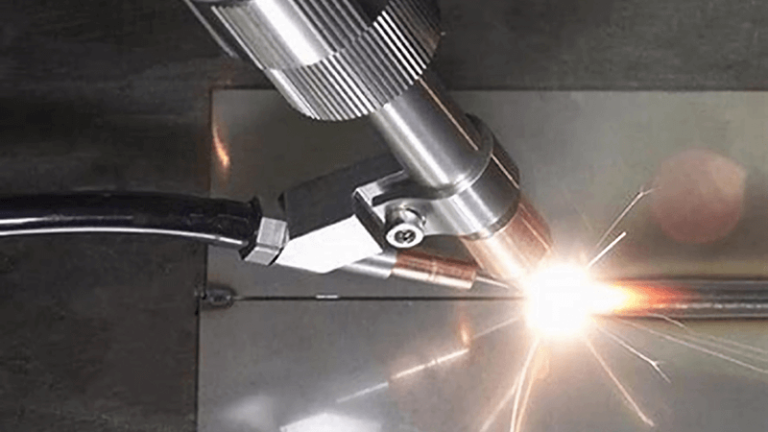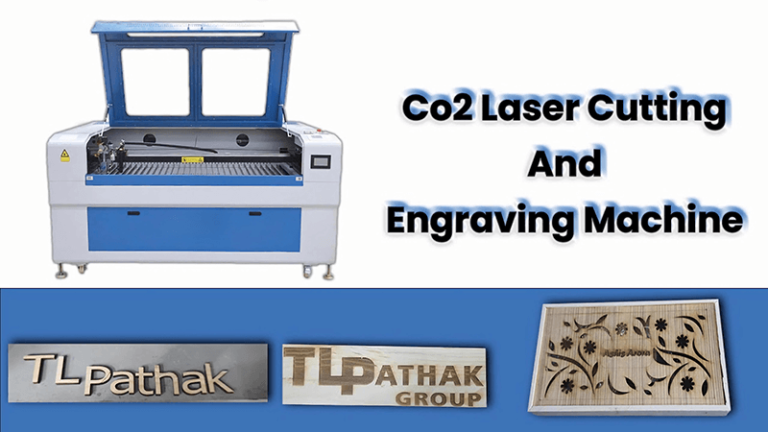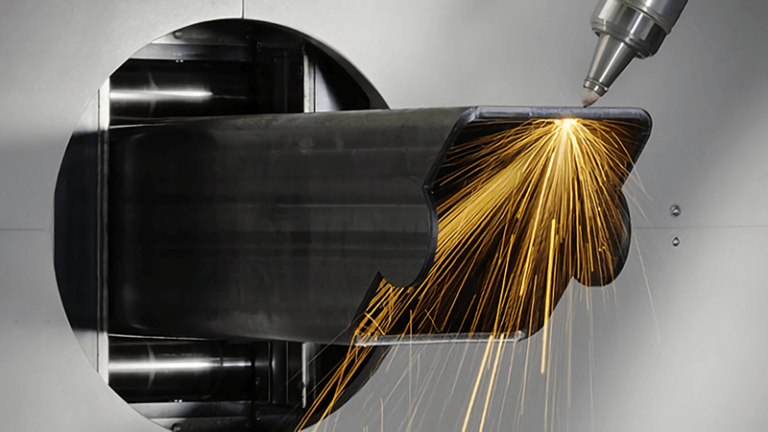Are you considering a laser cleaning machine but unsure if it's the right choice for your business? With the rise in demand for precision and efficiency, laser cleaning technology has become a popular option. In this post, I’ll walk you through why it might be the perfect solution for your needs.
Laser cleaning machines provide an effective, environmentally friendly solution for removing contaminants, rust, and coatings from various surfaces. Whether you're in aerospace, shipbuilding, or any other industry, a laser cleaning machine can boost your efficiency and precision. Let’s explore why you should choose this technology.
Laser cleaning has gained significant attention due to its precision and eco-friendliness. But what exactly does a laser cleaning machine do? And are these machines really as effective as they seem? Let’s dive into these questions and get to the heart of the matter.

What is the purpose of a laser cleaning machine?
Laser cleaning machines are revolutionizing the way we handle surface preparation and maintenance. But what exactly do they do? Understanding their purpose is the first step in deciding if one is right for your business.
At their core, laser cleaning machines use focused laser beams to remove contaminants like rust, coatings, and debris from surfaces. They’re highly efficient, eco-friendly, and can be used on a wide range of materials. Let’s take a closer look at what makes laser cleaning so effective.
Laser cleaning1 is an advanced surface preparation method that uses laser technology to remove unwanted materials like rust, paint, and oil from metal and other substrates. The key difference between laser cleaning and traditional methods is the precision and gentleness that the laser technology offers. By focusing the laser on contaminants, laser cleaning can selectively remove unwanted materials without damaging the base material. Below are the key aspects of the process:
Laser Energy Absorption and Evaporation
Laser cleaning works by directing high-intensity light onto the surface. The material to be cleaned absorbs the laser energy, which causes it to heat up rapidly. This heat causes the contaminants to evaporate, sublimate, or be blown away due to the force of the laser. The cleaning process is highly effective for delicate parts, where traditional methods such as abrasive or chemical cleaning could cause damage.
Minimal Surface Damage2
The precision of laser cleaning minimizes the impact on the underlying surface. Traditional cleaning methods can involve physical contact, which can scratch or erode the material. Laser cleaning, however, is a non-contact process, significantly reducing the chance of damaging the workpiece, especially for sensitive components such as those in aerospace or electronics.
Versatility for Different Materials3
Laser cleaning is adaptable to a wide range of materials, including metals, plastics, composites, and ceramics. This flexibility makes it an ideal solution for industries that work with diverse materials. From removing paint and coatings to cleaning metals before welding, laser cleaning can be used in various industries, ensuring efficient and precise cleaning.
| Process Feature | Laser Cleaning | Traditional Cleaning Methods |
|---|---|---|
| Contact with Surface | Non-contact | Physical contact (abrasives, chemicals) |
| Damage to Substrate | Minimal | Higher risk of damage |
| Speed | Fast (varies by surface area) | Often slower, requires more manual labor |
| Environmental Impact | Low (no chemicals or abrasives needed) | Higher (chemical waste, abrasive particles) |
| Material Compatibility | High (works on metals, plastics, ceramics) | Varies by method (abrasives may be limited to specific materials) |
With these advantages, laser cleaning becomes an essential technology in various industries, offering both high precision and minimal environmental impact.

Are laser cleaning machines any good?
With so many cleaning options available, it’s natural to question whether laser cleaning machines are truly effective. After all, adopting a new technology is a significant investment. Let’s dive into the reasons why laser cleaning is worth considering.
Laser cleaning machines are not only effective, but they also offer numerous advantages, including precision, speed, and eco-friendliness. These benefits make them a great choice for industries that require thorough and gentle cleaning solutions. Here’s why they’re worth the investment.
Laser cleaning technology4 offers several distinct advantages over traditional methods, particularly when it comes to precision, efficiency, and sustainability. Let’s take a deeper look at why laser cleaning machines have become a go-to solution in various industries:
High Precision and Control
One of the biggest advantages of laser cleaning is its high precision. Lasers can be finely tuned to target specific contaminants without affecting the surrounding material. This is especially important in industries such as aerospace or electronics, where the integrity of components is critical. With laser cleaning, you can remove rust, coatings, and debris with pinpoint accuracy, minimizing the risk of damage.
Speed and Efficiency
Laser cleaning is far faster than many traditional methods. For instance, in shipbuilding or heavy manufacturing, cleaning large structures with abrasive or chemical methods can take hours or even days. Laser cleaning reduces this process to a matter of minutes. By using continuous wave (CW) lasers for large-scale cleaning or pulsed lasers for delicate tasks, you can drastically cut down on cleaning times.
Eco-friendly Laser Cleaner
Another compelling reason to use laser cleaning is its environmental benefits. Traditional cleaning methods often require harsh chemicals, solvents, and abrasives that generate waste and pose environmental hazards. Laser cleaning, however, is a dry process that requires no chemicals, and it generates minimal waste. This makes it an environmentally friendly alternative, helping businesses meet sustainability goals while reducing disposal costs.
Cost-Effective in the Long Run5
While the initial cost of a laser cleaning machine may be higher than traditional cleaning equipment, the long-term savings can be significant. Laser cleaning reduces labor costs, as it is largely automated. Additionally, it eliminates the need for chemicals and abrasives, further cutting down on maintenance and material costs. For industries with high-volume cleaning needs, this cost-effectiveness is an important consideration.
Versatility
Laser cleaning is incredibly versatile, capable of cleaning a wide variety of materials including metals, ceramics, and composites. It’s used in many industries, from automotive and aerospace to manufacturing and even cultural heritage restoration. The adaptability of laser cleaning machines ensures that they can be used in a broad range of applications, making them a valuable investment for businesses across different sectors.
| Key Benefit | Laser Cleaning | Traditional Methods |
|---|---|---|
| Precision | High (targeted cleaning) | Varies (risk of damage) |
| Speed | Fast (ideal for large areas) | Slow (requires more time and effort) |
| Environmental Impact | Low (no chemicals or waste) | High (chemical waste, abrasive debris) |
| Cost Efficiency | Long-term savings (automated, minimal material use) | Higher maintenance and material costs |
| Application Versatility | Wide range of materials and industries | Limited by material compatibility |
In conclusion, laser cleaning machines are highly effective, offering precision, speed, and environmental benefits. These qualities make them an excellent investment for businesses seeking efficient and sustainable cleaning solutions.

How to choose a laser cleaning machine?
Selecting the right laser cleaning machine can seem overwhelming, especially with so many options on the market. But don’t worry! I’ll guide you through the key factors you should consider to ensure you make the right choice for your business.
When choosing a laser cleaning machine, factors such as the type of laser, material compatibility, power requirements, and application scale are essential. Let's break down these considerations to help you find the perfect machine for your needs.
When choosing the right laser cleaning machine, you need to consider several factors to ensure the machine suits your specific cleaning needs. Let’s explore each of these aspects in detail:
1. Type of Laser: Pulsed vs. CW
The choice between pulsed and continuous wave (CW) lasers is one of the most important decisions you’ll make when selecting a laser cleaning machine. Both types of lasers have different characteristics and are suited for different applications:
-
Pulsed Lasers6: Pulsed lasers offer high peak power in short bursts, making them ideal for cleaning delicate or thin materials without causing damage. They are commonly used in industries like aerospace or electronics, where precision is crucial. Pulsed lasers are effective for removing light coatings, rust, and contaminants from smaller or more sensitive parts.
-
CW Lasers7: Continuous wave lasers offer a continuous output of energy, making them suitable for large-scale cleaning projects. They can quickly and efficiently remove thicker coatings, paint, and rust from larger surfaces. CW lasers are commonly used in industrial sectors like shipbuilding or automotive manufacturing.
| Laser Type | Pulsed Lasers | CW Lasers |
|---|---|---|
| Power Output | High peak power in short bursts | Continuous power output |
| Ideal Use | Delicate tasks, small components | Large-scale industrial cleaning |
| Speed | Slower (precise cleaning) | Faster (for large areas) |
| Material Compatibility8 | Sensitive, thin materials | Thick, large structures |
2. Material Compatibility
Different laser cleaning machines are designed for different materials. It’s essential to choose a machine that is compatible with the materials you typically work with. For instance, if you work predominantly with metals, you will need a laser cleaning machine that has the power to effectively remove rust or coatings from steel, aluminum, or other metals. On the other hand, if you need to clean delicate plastics or composites, you’ll require a more controlled, low-power laser to prevent damage.
3. Power Requirements
Laser cleaning machines come in a range of power ratings, typically measured in watts (W). Higher power lasers are capable of cleaning thicker layers of contaminants or cleaning larger surface areas faster. If you’re cleaning small components, a lower-powered machine may suffice. However, if you’re working with large metal structures or heavy rust, a high-powered laser will be more effective.
4. Application Scale
The scale of your cleaning tasks will also affect the type of machine you choose. If your tasks involve cleaning small or highly detailed components, a smaller, more precise machine will work best. However, for large-scale industrial cleaning tasks, such as cleaning ships or large metal structures, a machine with higher power and a larger cleaning surface area will be necessary to maximize efficiency.
By considering these factors, you can select a laser cleaning machine that best fits your business needs, ensuring that you can handle your cleaning tasks efficiently and effectively.
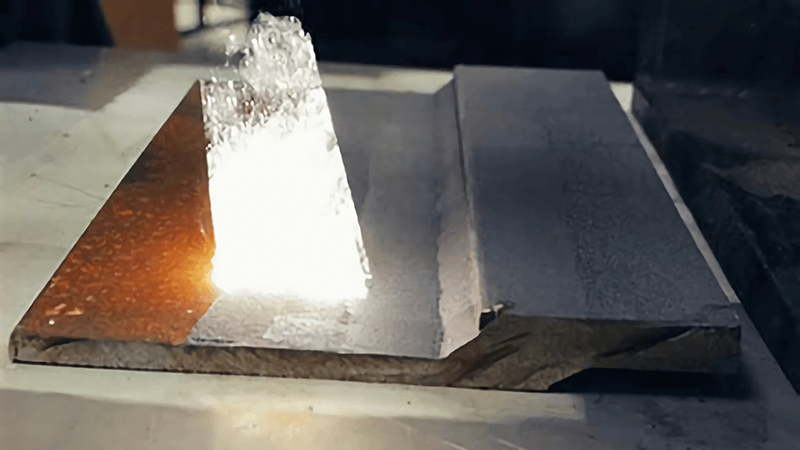
Is laser cleaning worth it?
Is investing in a laser cleaning machine truly worth it? The short answer is yes—laser cleaning offers numerous benefits that make it a worthwhile investment. But let’s break down why laser cleaning is not just a trend, but a long-term solution for businesses.
Laser cleaning may seem like a significant investment at first, but its long-term benefits—such as increased efficiency, lower maintenance costs, and environmental sustainability—make it a smart choice. Let’s explore how laser cleaning can improve your operations.
Laser cleaning technology is definitely worth the investment for businesses that need an efficient, precise, and sustainable cleaning solution. One of the main advantages is the reduction in labor costs9. Traditional cleaning methods often require significant manpower, whether it’s for abrasive methods or chemical treatments. Laser cleaning, however, is a largely automated process, which reduces the need for extensive labor and minimizes human error.
Additionally, laser cleaning is much faster than traditional methods, which leads to reduced downtime. This is particularly valuable in industries that rely on continuous operations, such as aerospace or manufacturing. Faster cleaning means that machines and parts can be returned to service more quickly, resulting in increased productivity.
From an environmental standpoint, laser cleaning is a more sustainable option. Since it doesn’t require chemicals or abrasives, it eliminates the need for hazardous waste disposal, making it a greener alternative to traditional cleaning methods. This not only helps the environment but can also help businesses reduce their environmental impact10 and comply with stricter regulations.
Ultimately, the investment in a laser cleaning machine pays off through reduced costs, faster processing times, and environmental benefits, making it a smart choice for many industries.
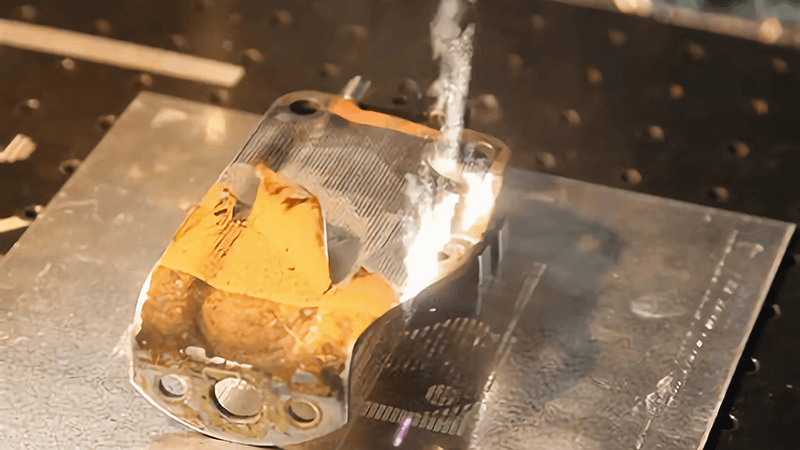
Conclusion
To sum up, choosing a laser cleaning machine11 offers numerous advantages, from precision and speed to eco-friendliness and cost efficiency. Whether you’re in aerospace, shipbuilding, or another industry, laser cleaning can significantly improve your operations. By selecting the right machine for your needs and maintaining it properly, you can enjoy these benefits for years to come.
-
Explore the advantages of laser cleaning technology, including its precision and environmental benefits, to understand its impact on various industries. ↩
-
Learn how laser cleaning techniques reduce surface damage, making them ideal for sensitive components in industries like aerospace and electronics. ↩
-
Discover the wide range of materials that laser cleaning can effectively clean, showcasing its versatility across different industries. ↩
-
Explore the benefits of laser cleaning technology, including precision and eco-friendliness, to understand its impact on various industries. ↩
-
Learn about the long-term savings associated with laser cleaning, including reduced labor and material costs, which can benefit your business. ↩
-
Explore the benefits of Pulsed Lasers for precision cleaning, especially for delicate materials, to enhance your cleaning processes. ↩
-
Learn how CW Lasers can efficiently tackle large-scale cleaning tasks, making them ideal for industrial use. ↩
-
Understanding Material Compatibility is crucial for selecting the right laser cleaning machine for your specific materials. ↩
-
Discover insights on how laser cleaning can significantly lower labor costs while improving cleaning efficiency. ↩
-
Learn about the environmental benefits of laser cleaning and how it can help your business comply with regulations. ↩
-
Know more about laser cleaning machine from Kirin Laser and get your best solutions, as well as prices. ↩


